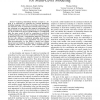Free Online Productivity Tools
i2Speak
i2Symbol
i2OCR
iTex2Img
iWeb2Print
iWeb2Shot
i2Type
iPdf2Split
iPdf2Merge
i2Bopomofo
i2Arabic
i2Style
i2Image
i2PDF
iLatex2Rtf
Sci2ools
MODELS
2015
Springer
2015
Springer
A unifying approach to connections for multi-level modeling
Abstract—Capturing relationships between concepts in a domain is as important as capturing the concepts themselves. Modeling languages reflect this by providing connections with rich semantics, such as associations and links, thus providing a key advantage over approaches that support relationships with simple references only. While connections for two-level modeling (e.g. in the UML) have enjoyed a stable design for a considerable time, the same cannot be said for connections in multi-level modeling languages. As interest in multi-level modeling grows, it is important to provide a comprehensive design for connections that not only adheres to multi-level principles such as levelagnosticism and explicit level organization, but also supports deep characterization, i.e., the ability to specify level content beyond one level boundary. In this paper we propose a unifying conceptual model for connections whose expressiveness and scalability does not come at the cost of concept proliferati...
Related Content
| Added | 15 Apr 2016 |
| Updated | 15 Apr 2016 |
| Type | Journal |
| Year | 2015 |
| Where | MODELS |
| Authors | Colin Atkinson, Ralph Gerbig, Thomas Kühne |
Comments (0)

